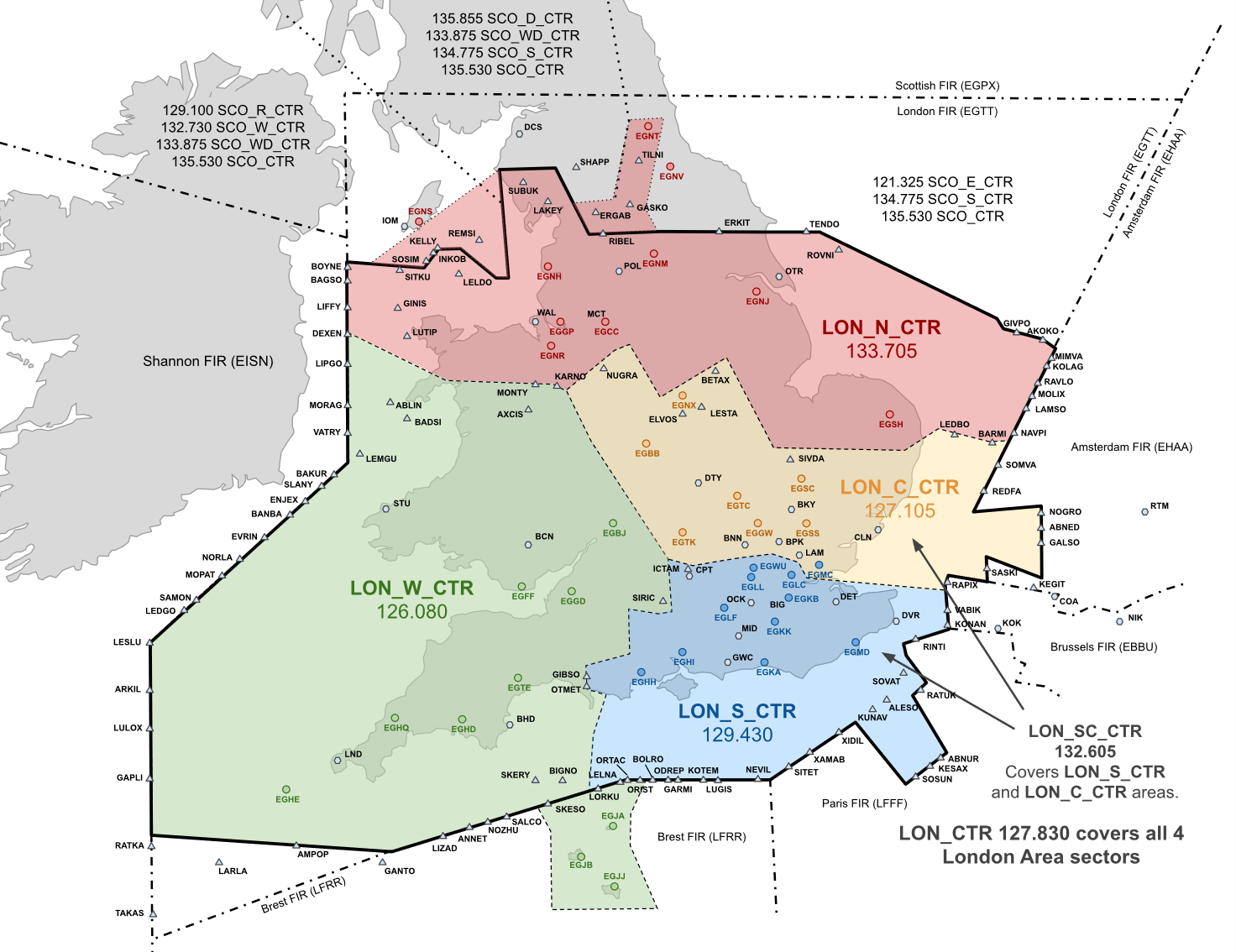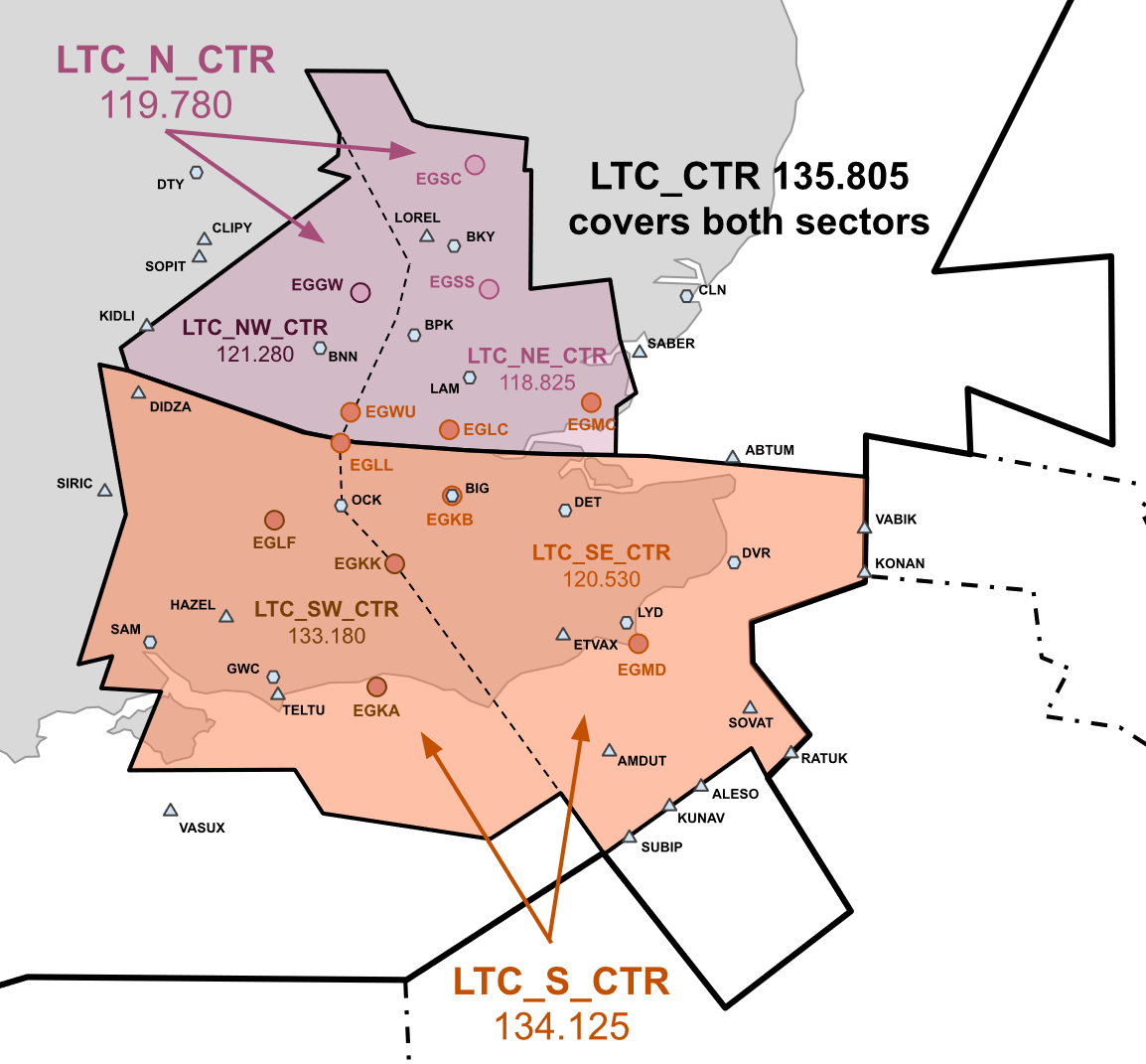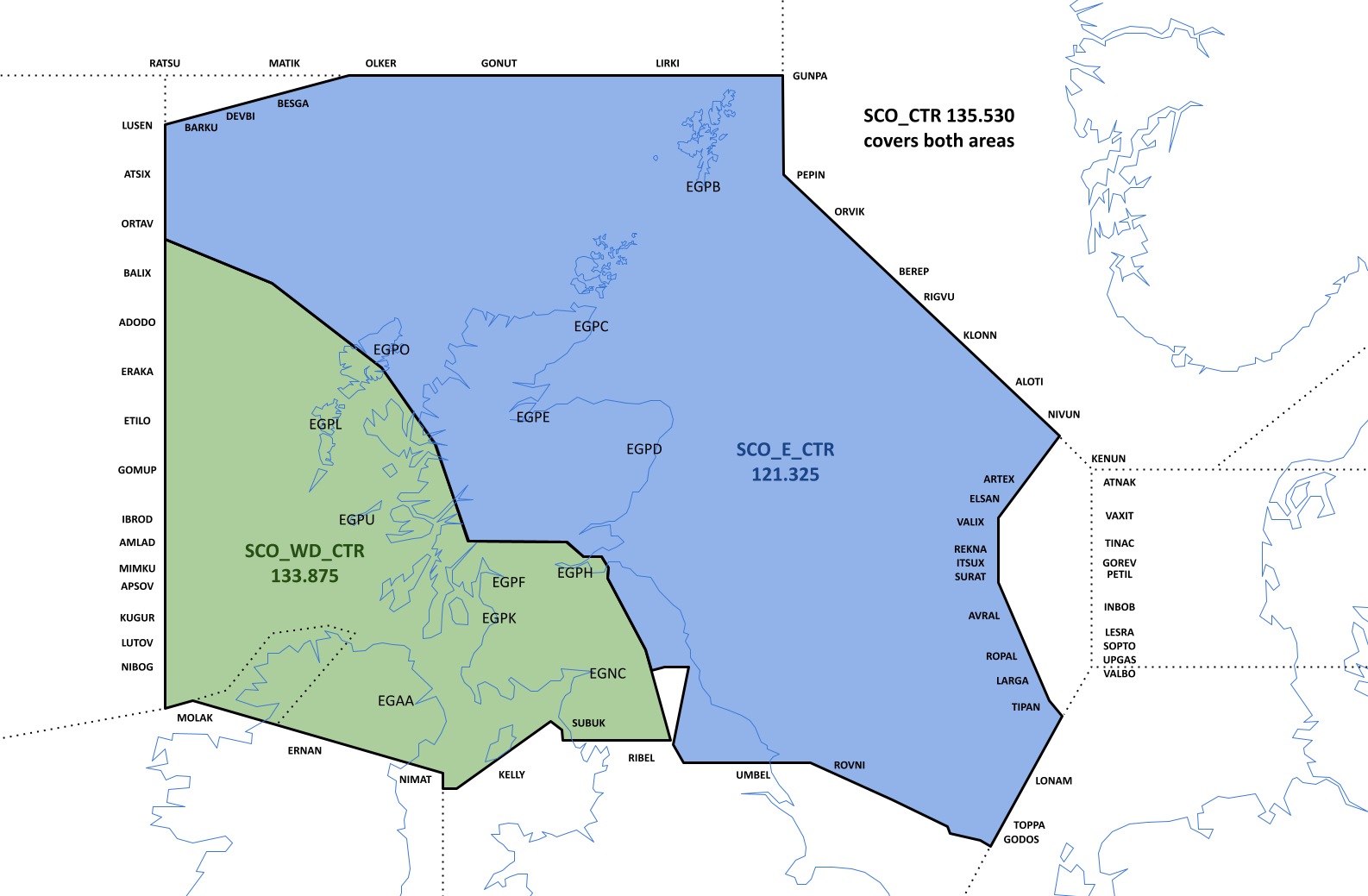VATGlasses is a tool displaying accurate coverage in the UK. You can adjust the slider to show coverage at different levels and also track your flight.
VATGlasses data is also used by VATSIM Radar.
Please note: Other tools such as VATSpy, SimAware and Qutescoop may not 'light up' the correct areas.
Introduction
This page explains the basics of the Enroute (CTR) sectors in the UK. The information is split into sections for different stages of flight.
If you are ever unsure who to call, please message one of our controllers. They will be more than happy to help!
Do not call EGTT_I_CTR or EGPX_I_CTR as civilian ‘airliner’ traffic – these positions are for UK Flight Information Services (FIS) outside of controlled airspace only.
Do not call EGVV_CTR as a civilian ‘airliner’ – these positions are for Military operations. UK FIS may be available on request (normally only above FL100).
Radio Callsigns
The two main radio callsigns for Area controllers in the UK are:
- "London Control" – all LON and LTC callsigns
- "Scottish Control" – all SCO, STC and MAN callsigns
Always contact local ATC (DEL/GND/TWR/APP) where it is online.
Some APP positions cover more than one airfield top-down:
- EGAA_APP – Belfast/Aldergrove (EGAA) and Belfast/City (EGAC)
- EGGP_APP – Liverpool (EGGP) and Hawarden (EGNR)
- EGJJ_C_APP – Jersey (EGJJ), Guernsey (EGJB), and Alderney (EGJA)
- EGNO_APP – Blackpool (EGNH) and Warton (EGNO)
- EGNT_APP – Newcastle (EGNT) and Teesside (EGNV)
- ESSEX_APP – London/Stansted (EGSS), London/Luton (EGGW), and Cambridge (EGSC)
- EGSS_APP – London/Stansted (EGSS) and Cambridge (EGSC)
- SOLENT_APP – Southampton (EGHI) and Bournemouth (EGHH)
- THAMES_APP – London/City (EGLC), Southend (EGMC), and Biggin Hill (EGKB)
What is top-down?
In the absence of local ATC, area and approach controllers provide a top-down service at airfields in their area of responsibility. You should request clearance, pushback, taxi, etc., as if there were an aerodrome controller online.
Are all airfields covered top-down?
Controllers provide top-down service at all airfields with a permanent Tower or Approach facility in the real world, including airports outside of controlled airspace.
When busy, controllers may downgrade service at quieter airfields. You must contact the controller before departure to check the service provided.
If you are departing from an airfield outside of controlled airspace and intending to join in-flight, ensure you obtain a joining clearance beforehand.
How do I know who to call?
When there is no local ATC, contact the first listed controller below that is online (left to right priority). Callsigns may vary, so always check the frequency.
You can also refer to the sector maps in the next section.
Manchester (EGCC)
MAN_SE_CTR (134.430) → MAN_E_CTR (133.800) → MAN_CTR (133.200) → LON_N_CTR (133.705) → LON_NW_CTR (135.580) → LON_CTR (127.830)
Leeds (EGNM), Humberside (EGNJ), Newcastle (EGNT), Teesside (EGNV)
MAN_NE_CTR (135.715) → MAN_E_CTR → MAN_CTR → LON_NE_CTR → LON_N_CTR → LON_CTR
Liverpool (EGGP), Hawarden (EGNR), Isle of Man (EGNS), Blackpool (EGNH)
MAN_W_CTR → MAN_CTR → LON_NW_CTR → LON_N_CTR → LON_CTR
Norwich (EGSH)
LON_NE_CTR → LON_N_CTR → LON_CTR
East Midlands (EGNX), Birmingham (EGBB), Coventry (EGBE), Oxford (EGTK), Cranfield (EGTC)
LTC_M_CTR → LON_M_CTR → LON_C_CTR → LON_SC_CTR → LON_CTR
London/Stansted (EGSS), Cambridge (EGSC)
LTC_NE_CTR → LTC_N_CTR → LTC_CTR → LTC_E_CTR → LON_E_CTR → LON_C_CTR → LON_SC_CTR → LON_CTR
London/Luton (EGGW)
LTC_NW_CTR → LTC_N_CTR → LTC_CTR → LTC_M_CTR → LON_M_CTR → LON_C_CTR → LON_SC_CTR → LON_CTR
London/Heathrow (EGLL), London/City (EGLC), Southend (EGMC), Biggin Hill (EGKB), Lydd (EGMD)
LTC_SE_CTR → LTC_S_CTR → LTC_CTR → LON_D_CTR → LON_S_CTR → LON_SC_CTR → LON_CTR
London/Gatwick (EGKK), Farnborough (EGLF)
LTC_SW_CTR → LTC_S_CTR → LTC_CTR → LON_S_CTR → LON_SC_CTR → LON_CTR
Southampton (EGHI), Bournemouth (EGHH)
LON_S_CTR → LON_SC_CTR → LON_CTR
Bristol (EGGD), Cardiff (EGFF), Exeter (EGTE), Gloucester (EGBJ), Newquay (EGHQ), Channel Islands (EGJJ/JB/JA)
LON_W_CTR → LON_CTR
Edinburgh (EGPH), Glasgow (EGPF), Prestwick (EGPK)
STC_CTR → SCO_D_CTR → SCO_WD_CTR → SCO_S_CTR → SCO_CTR
Belfast/Aldergrove (EGAA), Belfast/City (EGAC)
STC_A_CTR → SCO_R_CTR → SCO_W_CTR → SCO_WD_CTR → SCO_CTR
Aberdeen/Dyce (EGPD), Dundee (EGPN)
SCO_S_CTR → SCO_E_CTR → SCO_CTR
Inverness (EGPE), Stornoway (EGPO), Kirkwall (EGPA), Sumburgh (EGPB), Wick (EGPC)
SCO_N_CTR → SCO_E_CTR → SCO_CTR
Our controllers will always send you a contact me if you are entering their airspace. However, you can use the diagrams below or VATGlasses if you want to know when to call them in advance.
You should look up and plan for descent according to your expected STAR.
You can also report your expected STAR on first contact to save time.
If you need to descend before you enter an online controller’s airspace, then do so.
London - Main Positions
The main London sector groups (North, South, Central, and West) are shown below.
Sometimes these sectors are combined using the LON_SC_CTR or LON_CTR callsigns.

Example:
If LON_CTR, LON_S_CTR, and LON_W_CTR are online:
- Red (North) — controlled by
LON_CTR - Yellow (Central) — controlled by
LON_CTR - Blue (South) — controlled by
LON_S_CTR - Green (West) — controlled by
LON_W_CTR
London - TMA Split Positions
We can also split off the airspace in the London area with LTC sectors.
There are four main sectors:
- NE
- NW
- SE
- SW
These may be combined using:
LTC_N_CTRLTC_S_CTRLTC_CTR
Key Points:
- The top of these sectors is generally at FL155, but not above FL195.
- It is especially important to descend according to your STAR when only LTC sectors are online.
- Do not wait for a "contact me" before starting descent.

Scottish - Main Positions
You will most often see SCO_CTR, which covers all Scottish airspace.
The diagram below shows the two main upper splits.
STC_CTR: Below FL255 around the Scottish TMA, covering EGPH, EGPF, and EGPK.STC_A_CTR: Below FL255 in the Belfast area, covering EGAA and EGAC.
Further Scottish splits may be used during events.

If you are departing from an airfield as VFR, please see the section above — "I am departing from a UK airfield".
If you want to enter controlled airspace, you must check if any controller is covering that airspace.
If yes, you need to get a clearance before entering it.
By using the altitude slider on VATGlasses, you can check for coverage.
Feel free to ask a controller whether they cover airspace if you are unsure.
London & Scottish Information
- EGTT_I_CTR (124.600) – "London Information"
- EGPX_I_CTR (119.875) – "Scottish Information"
Both of these positions are able to provide a Basic Service to flights outside of controlled airspace.
This is a type of UK Flight Information Service (UK FIS)
(see page 71 of The Skyway Code).
They are also able to arrange airspace joining clearances for IFR departures from airfields not covered top-down.
Military airfields are not covered top-down by the civilian Area (CTR) Control positions.
If local military ATC is online, you should contact them on the ground or if you are inbound.
Otherwise, if Swanwick Mil is online, they can provide a service in all UK airspace and at military airports.
EGVV_CTR (133.900) – "Swanwick Mil"
Covers EGTT and EGPX FIR airspace and airports for military operations.
If you are departing from a military airfield and joining controlled airspace in the same way civilian air traffic does,
you must get a joining clearance from the relevant civilian area sector before you enter controlled airspace.
If you are unsure who to contact, please ask a controller or check VATGlasses.